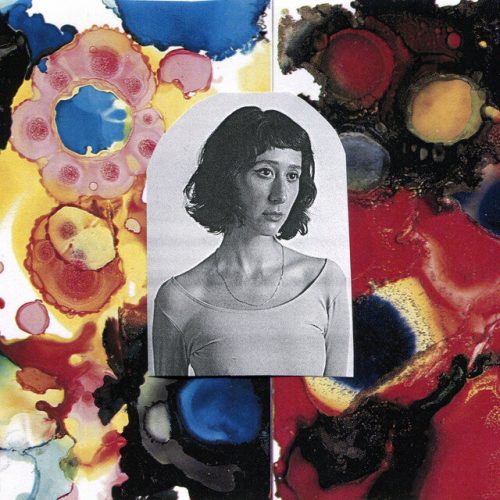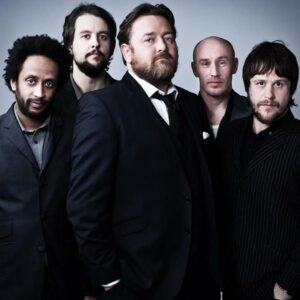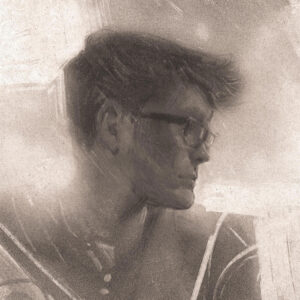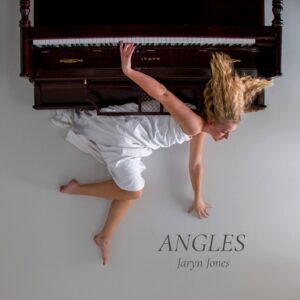“Amelia,” a new song by the New York-based singer-songwriter Jackie West, is a rich, soothing piece of music. West plays jazz-inflected folk, and on “Amelia” she takes the coziest elements of both genres and knits them into a warm sweater. The mellow guitar strum isn’t far removed from Jessica Pratt, but while Pratt’s strange, elfin voice is an acquired taste, West’s voice is as sweet and smooth as a cup of vanilla coffee. The arrangement choices are lovely as well, with a muted horn providing a subtle cushion before strings glide into the mix. “Amelia” is a perfect song for a cozy morning playlist; it’s the kind of music that makes you crave a croissant.
Thankfully, West is too strong a songwriter to succumb to the tyranny of “vibes.” As pleasant a song as “Amelia” is, it never fades into the background, and never uses its easy sound as an excuse to neglect songcraft. West sings about a dear friend, the kind of friend that provides support and stability even when other aspects of your life are in shambles: “Amelia, you’re waking my heart/I go near you when things come apart.” It’s not necessarily a romantic relationship, but some friendships are closer than that: they provide support, shelter (“could live in your aura”), and ideas for the future (“inspiration comes between the porch and the light beam.”) West is clearly an independent spirit–this is someone who left formal music training to work on farms in Martha’s Vineyard, after all–but that just makes this heartfelt tribute to a friend so much more meaningful.
Is there a particular story behind “Amelia?” Was it inspired by a true experience?
Amelia is an actual friend who is also my opposite in many ways. She is daring and quite feisty and a bit blind to danger– or what I see as danger, and lives by a high code of intuitive ethics. I admire her both like a big sister and as a tempestuous muse. She seems to always have the salve for the spiritual wound. I remember when we first met in high school I wrote a poem about her, hoping I could soothe her sorrow (she had broken up with a love for no real reason she could put her finger on) called “purple raindrops” it was my attempt to send healing to her because I knew, as friends do, how beautiful she was in all her imperfections and mystery, and that she was going to be OK. Since then, we have been medicine to each other in many ways, though she lives on the opposite side of the country now and we rarely get to meet. That immense love and trust runs deep.
You grew up in a musical family–could you tell us a bit more about that? How did it shape your approach to music?
Yeah! My dad plays bass and I grew up playing on the beach as a kid while he played shows with his band. They were a part of the 70s Boston rock scene. I’d be looked after by his roadies and lots of tough looking ladies who I remember smelled amazing. My brother plays drums, learning from my dad’s pretty traditional rock approach and he also plays guitar and sings so beautifully–his voice is holy to me. My brother is who I look up to where work ethic and conducive creative vibes are concerned. We jam a lot whenever we go home for the holidays. My dad built a studio in the basement years back and we would have a ball playing drums and doing spoken word poetry– we’d likely end up with all-guts-raging super feed-backy song forms. My sister also plays various instruments and sings– her lyrics are killer. My mom surprised me recently with her grungy guitar licks. She plugged into my Spider 6 amp with all the effects and had some treatment of crunch on and she played a few heavy-lidded notes at the right time and I was thrown off my seat. She can rock!
I guess from this type of nurturing, I felt like I was thrown into it–beyond my will at times–and my dad is incredibly knowledgeable about music, but in a way where he doesn’t really explain it–he learned through years of experience and that’s the approach he instilled in me. I felt unsure about just throwing myself into performing when I started writing songs, because I wanted to understand what and why I was going to these places musically. But even after studying a bit, the best lesson I learned is application. Music, to me, always begins with a feeling, then becomes a maze I both create and find my way out of. My dad told me that musicians go to art school, not music school. It’s hard for me to agree with such a platitude, but that was the way my dad found would encourage me to create.
You’ve also mentioned that you left your music studies behind to work in boatyards and farms on Martha’s Vineyard. What prompted that decision, and what effect did that work have on your creative output?
I always studied music in a patchwork way. It was normal for me to take guitar lessons in bulk for a year and stop them for a couple years, returning in a frenzy, taking a couple ensemble classes and vocal and theory, then giving it up, likely to process and integrate in my own time. The period when I went to Martha’s Vineyard to work, I was studying basic theory and harmony on the piano and I felt that I had enough to take with me–my brain processes things very slowly and I found that there was so much good stuff I could use to create from this knowledge, that I spent time in nature working on farms and whatnot. I was working on the island, not vacationing, to be clear.
I had friends who were from Martha’s Vineyard and also had a jug band called the Hogstompers. I was introduced to the fun of this music at the hootenannies we would have in the forest. I started singing some songs I had written but never showed, and just made up songs when we jammed. Something about the hard labor of farming and seafaring during the day and coming together at night all salty and dirty, but happy because of our dose of nature, really struck me. It introduced me to music in a different way than how I grew up–in the sense that it was being created by my peers for the sake of making merriment with food and as a natural way to unwind.
There’s a lovely marriage of folk and jazz on “Amelia.” Do you consciously balance the different musical elements so they blend, or is it more of an intuitive thing?
Since I became enthralled by jazz standards, I have wanted to study them solely for the purpose of finding out how melodies move, why and where they can go. Before getting into standards, my songs seemed to lack a sense of movement and although traditional folk speaks to my heart in a most critical way, I didn’t like constructing songs with those chord progressions; they felt too natural and a bit overdone to me at the time. I am forever indebted to the gorgeousness of traditional folk tunes, however. They are the reason I play guitar. Jazz standards are like wicked condensed classical pieces that focus mostly on the rhythm of the melody and are based on one strong interval theme (at least that’s my reductionist approach) so jazz has helped me be more of a detective when writing songs, like when I’m finding a melody in my heart, I apply the chords also from my heart and then sorta think about where I can go based on all these paths I’ve studied and the feelings they conjure. Writing is intuitive mostly because I never really know if it makes “sense” it will just seem like the right placement–the right movement to me.
What’s your greatest ambition?
My greatest ambition is ever-defining itself, but right now I’d say writing songs that have their own life and take care of people in some way because they exist is the focus. I’d like to feel like my music is useful. Another, very personal ambition, is to write a book of poems.







